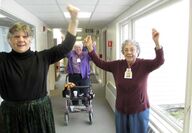Sorted by date Results 928 - 952 of 1010

Every time you visit your mom in the assisted living home, she complains she isn’t getting her medication. When you question staff, they show you the medication log and it seems to indicate she is getting what the doctor prescribed. Is your mom just forgetting that she was given her medication? I wouldn’t be so sure. Theft of prescription drugs is a growing problem nationally, especially controlled substances such as opioids for pain and benzodiazepines for anxiety. Health care workers have as...

"I see a lot of seniors who have done something right. Many are fit and active into their 80s and 90s." Betty Burke shares this positive assessment when reflecting on her position as Health Outreach Nurse at the Chugiak-Eagle River Senior Center. "My job is to promote optimal wellness in the senior population here," she says, "to promote fitness in general." Six years ago, Burke hooked onto the idea of launching a program related to the Iditarod Sled Dog Race, focusing on February fitness for...
The lifelong probability of a marriage ending in divorce is between 40 and 50 percent, according to PolitiFact.com’s estimates. Couples in trouble often seek advice from friends, family and counselors. But global marriage expert Mort Fertel, creator of the Marriage Fitness Tele-Boot Camp and author of “Marriage Fitness,” says much of the advice couples get is bad. “Much of the advice people get about their marriage problems is wrong. It sounds good. It makes sense. The problem is: it usually doesn’t work,” Fertel says. “Reconciling a broken mar...
Alaska Health Fairs, Inc. begins its spring series of health fairs this month, featuring free health screenings and education, low cost blood tests and more. The tests can help you learn about your health and detect potential problems early, when treatment or changes in personal habits can be most effective. The test results give you and your health care provider important information about your physical condition and vital organ functions. A complete and comprehensive chemistry/hematology test is available for only $45 and panels 27 different...
Is vision loss causing you to have trouble keeping up with activities you used to enjoy? This March in Kodiak, find out how a functional low vision screening and daily living tips can improve your life. Discover specialized magnifiers and other devices as well as safety techniques that can help you enjoy those activities again. The low vision clinic will be held March 4-7 at the Kodiak Senior Center, 302 Erskine Ave. You can schedule a screening at the clinic with Charity Son, Low Vision Coordinator, Alaska Center for the Blind and Visually...

Tomatoes potent in fighting breast cancer Eating a diet rich in tomato and tomato products may help protect against breast cancer. A new study by researchers in Ohio has found that eating a diet high in tomatoes had a positive effect on hormone levels that play a role in regulating fat and sugar metabolism. The researchers conducted a study with older women who were at high risk for breast cancer. “The advantages of eating plenty of tomatoes and tomato-based products, even for a short period, w...
In an effort to encourage more Alaskans to get immunized against the flu, the Alaska Division of Public Health will continue waiving the standard $28 administrative fee for the flu vaccine at all state public health centers in Alaska and at the Municipality of Anchorage Public Health Center. The fee waiver is in effect through the end of March 2014 for certain Alaskans. As of Dec. 28, the state had recorded 242 laboratory confirmed cases of the flu. H1N1, or swine flu, is the dominant strain this season. Protection against the strain is...
The Kenai Peninsula Family Caregiver Support Program will hold the following meetings and trainings in February. Because this is National Heart Month, caregiver trainings will focus on being heart healthy. Feb. 4, Caregiver training at Sterling Senior Center, 1 p.m. Feb. 11, Caregiver training at Soldotna Senior Center, 1 p.m. Feb. 17, no meeting, President’s Day Feb. 25, Peer Support Meeting at Soldotna Senior Center, 1 p.m. There is no charge for these services and everyone is invited to attend. Training sessions provide 2 hours of C...
A new study involving several universities indicates that research into the delay of aging would have a better payoff than advances in such fatal diseases as cancer and heart problems. Even modest gains in the scientific comprehension of how to slow the aging process would mean 11.7 million more healthy seniors over age 65 in 2060 than even optimistic advances in cancer and heart research. This is according to analysis by scientists from the University of Southern California, Harvard University, Columbia University, the University of Illinois...
Early registration is open for a one-day workshop on Alzheimer’s disease and related dementia, to be offered in February in Anchorage, Fairbanks and Sitka. Sponsored by Alzheimer’s Resource of Alaska, the interactive workshop, titled “Accepting the Challenge,” will feature Teepa Snow, a renowned expert on Alzheimer’s and dementia care. Snow is an occupational therapist currently working as a dementia care and dementia education specialist with an independent practice. She has clinical appointments with Duke University’s School of Nursing and...
Alaska Health Fairs, Inc. begins its next series of health fairs (we won’t call them spring health fairs yet) with four events in February, featuring free health screenings and education, low cost blood tests and more. The tests can help you learn about your health and detect potential problems early, when treatment or changes in personal habits can be most effective. The test results give you and your health care provider important information about your physical condition and vital organ functions. A complete and comprehensive chemistry/hemat...
Taking care of a parent or aging family member is part of daily life for thousands of Alaskans; it is a task that poses great challenges but also rewards those who accept the challenges with many memorable moments. In a writing contest held by the Alzheimer’s Resource of Alaska, Alaskans were given the opportunity to share some of their most memorable moments while caring for loved ones. Dozens of entries were received from across the state with winners in five age categories and one grand prize winner of 40,000 Alaska Airline miles. The g...
Alaska Health Fairs, Inc. begins its next series of health fairs (we won’t call them spring health fairs yet) with four events in February, featuring free health screenings and education, low cost blood tests and more. The tests can help you learn about your health and detect potential problems early, when treatment or changes in personal habits can be most effective. The test results give you and your health care provider important information about your physical condition and vital organ functions. A complete and comprehensive chemistry/hemat...
It’s the start of a new year, which is a time of review and reflection for many people. Now is also a good time to look at the Medicare changes that will happen this year, and a good time to talk about Medicare as an important source of health coverage for readers who’ll be turning 65. Q. What will 2014 bring for Medicare beneficiaries in terms of changes in out-of-pocket costs? While prices for everything seem to go up every year, the good news for Medicare beneficiaries is that premiums for Medicare Part B will remain the same for 2014, holdi...

Lowering your risk for dementia A good New Year’s resolution may be to simply exercise more and make sure you do not have high blood pressure. Just taking those two simple steps may significantly help lower your risk for developing dementia. It’s rare to hear good news about dementia. But that’s what a New England Journal of Medicine Perspective article is now reporting. The article discusses several recent studies that show dementia rates in older adults are on the decline. It is believed to be...
How much information can the human brain absorb? The answer may be put to the test at the Anchorage Senior Activity Center’s Third Annual Brain Olympics, Jan. 15. The event has proved very popular and gets bigger every year, organizers say. This year’s schedule is chock-full of special speakers giving presentations on a variety of brain-related topics: • “Music as Therapy: How Music Rocks Your Brains,” Laura Debenham, MSW • “Thoughts About the Brain,” Shirley Fraser, MD, neurologist • “Let’s Talk About Memory,” Marilyn McKay, Education Specia...
More than once have my well-intentioned suggestions for maintaining health been dismissed as not worth the effort. Even my wonderful mother, at 89 years, will sometimes say, “I don’t care if I live longer so stop telling me to exercise and eat right.” Other things I’ve heard are “we’ve all got to go some time” and “getting old is just a natural part of life so why resist it.” One of my latest suggestions to mom was that she improve her sleep. Living longer maybe isn’t the goal but living well while you are here certainly is worth some attentio...
Menopause, or change of life – as women become too old to bear children – can frequently be an agonizing and stressful time. But did you know there is male menopause? It’s one of the “most under-diagnosed” ailments among older men, according to Dr. Charles Cartwright of Urology Associates of Lake County, Florida. Cartwright is part of a group of central Florida urologists who have been trying to find new and better treatments for male menopause. He has diagnosed and treated hundreds of cases in his practice. As men age, their productio...

Time is running short December 7 is the last day you can change your plan for the Medicare drug program Part D, unless you are also on Medicaid or new to Medicare or need financial help. Some good news regarding Medicare costs The good news is that the 2014 Medicare premium, for those whose annual income is under $85,001, will be the same $104.90 and the Part B deductible will be the same $147 as in 2013. More about the insurance ‘Marketplace’ If you are on Medicare, Medicaid, TriCare, Ind...
If you need to sit down face-to-face with a certified Medicare counselor, there will be a “Last Chance Medicare Prescription Enrollment Clinic” at Providence Hospital in Anchorage, December 2 and 3, from 9 a.m. to 3 p.m. The address is 3200 Providence Drive (Elevator A to HIM training room near the Subway sandwich shop). There also will be a clinic at the Anchorage Senior Activity Center, December 5, from 9 a.m. to 3 p.m. If those times don’t work for you, call the Medicare Information Office at 269-3680 in Anchorage or toll-free from anywh...
Most people take for granted the ability to communicate through speech and gesture. From birth, much of our life is dedicated to first acquiring the ability to speak, and then improving it through continual use. The “Matthews Effect” explains how the more you read the better your reading skills become. Repetition is the guiding light to learning to speak, as we learned as infants and has been reinforced throughout our lives. For a stroke victim, at a time when he or she is already disoriented and afraid, the loss or impairment of language is...

Cranberries and chronic infections Go ahead and have an extra helping of cranberries over this holiday season. The latest studies show that cranberries pack a major nutritional punch and may help prevent chronic infections. In addition, researchers are now proposing the use of cranberry derivatives for preventing bacterial colonization in medical devices such as catheters. Cranberries are among one of the healthiest fruits and their history can be traced back to Native Americans who used to eat...
The Kenai Peninsula Family Caregiver Support Program will hold the following meetings and trainings in December: Dec. 3, Caregiver training at Sterling Senior Center, 1 to 2 p.m., “Living Old: Modern Realities of Aging”. Dec. 10, Peer support meeting at Soldotna Senior Center, 1 to 3 p.m. Dec. 11, Peer support meeting at Seward Senior Center, 1 to 3 p.m Dec. 23, Caregiver training at Kenai Senior Center, 1 to 3 p.m. “The Power of Forgiveness.” Dec. 31, Peer support meeting at Soldotna Senior Center, 1 to 3 p.m. Note: the Homer Support Group w...

Imagine your family is far away. Strangers bathe and dress you, but you’ve had a stroke, so it is hard to explain that your roommate is stealing your things. You’re a senior in a long term care home. You need someone to speak for you. You need an ombudsman. The best kind of ombudsman is the one who lives nearby and visits your home often. The ombudsman will get to know you and take the time to listen to your concerns. She or he can step in, with your permission, and work out solutions that mee...
“It was hard to see him go, he could hardly speak. I was so glad to have him here at home. One night I watched the kitty jump up on the bed near his head and Dick said very clearly ‘Hi Zackie.’ I knew then Dick knew he was home”. – June Juelson, widow of Richard Juelson, Anchorage. At any age, we must all face the possibility of a serious illness that we or our family and friends will not survive. Hospice helps patients and families focus on living by offering a family-centered team of trained professionals who provide care in the home, hos...